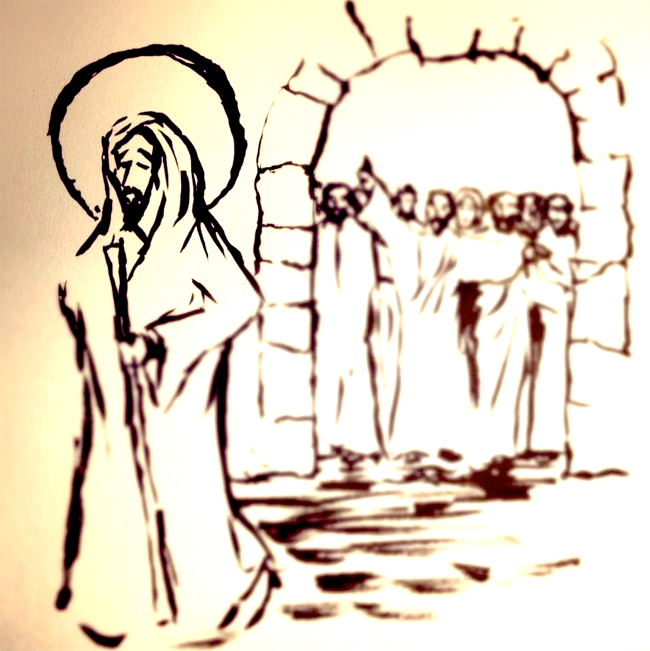Christian Art | Prayer | King James Audio Bible | KJV
Luke 11: 1-4 – Week 27 Ordinary Time, Wednesday (King James Audio Bible KJV, Spoken Word)
1 AND it came to pass, that, as he was praying in a certain place, when he ceased, one of his disciples said unto him, Lord, teach us to pray, as John also taught his disciples.
2 And he said unto them, When ye pray, say, Our Father which art in heaven, Hallowed be thy name. Thy kingdom come. Thy will be done, as in heaven, so in earth.
3 Give us day by day our daily bread.
4 And forgive us our sins; for we also forgive every one that is indebted to us. And lead us not into temptation; but deliver us from evil.
We are given different accounts of Jesus teaching his disciples the Lord’s Prayer, the Our Father, in today’s verses from the Gospel of Luke, and also in the Gospel of Matthew, during the Sermon on the Mount. Here the situation is quite different from that of Matthew. Jesus has been praying, seemingly apart, to his Father, and so it is after this that the disciples ask Jesus to teach them how to pray. This is unusual: prayer, especially of the psalms, would have been an integral part of these Jewish people’s daily routine. We are alerted to the Lord’s Prayer being an additional offering, an innovation of grace, and a further initiation for the Christian. The prayer furthermore reflects John the Baptist’s teaching of his disciples. Indeed, a perfectly reasonable translation of the Greek is to say that the disciples of Jesus are asking Jesus to teach them the very same prayer which John taught. We can only speculate as to the extent that Jesus ‘followed after’ John prior to beginning his ministry, during the course of his perfect humanity’s spiritual formation through the hidden years.
As Christians, we usually pray the version of the Lord’s Prayer given in Matthew. In Matthew’s Gospel, there are seven petitions. Here there are five. Both accounts are concerned to simplify prayer, to distil the form of words so as perfectly to capture the essentials of our true relationship with God. We confess and glorify God; we ask for the coming of the Kingdom, for holiness to triumph on Earth as in heaven; we ask for food to sustain us; we ask that we may be accepted and involved within an economy of universal forgiveness; and we ask that we may be protected from temptations of sin, from evil. As we make our petitions, we speak to God with the simplicity of a child addressing his father.
There has been much discussion of the rendering into English as ‘daily bread’ the Greek word epiousion. The word exists nowhere else that we know of, apart from in the Gospels of Mathew and Luke. The word appears to be a compound of epi and ousios. Epi means over, above, beyond, in addition to. Ousious refers to the substance of something. Therefore, putting these words together, we have something like supersubstantial, or super-essential. We have, perhaps, the Eucharist. We ask for the unfolding of supernatural reality within our daily, Earthly lives, along with basic sustenance. There is a certain sense of liminality as we gear our daily lives toward eternal reality, as, as Christians, we ask that our own little corner of the world may become among heaven’s outposts.
Concluding Prayer | Love Revealed By Jesus Christ
Lord, holy Father, faithful to your promise
you sent your Spirit
to bring together a people divided by sin.
Give us grace to foster unity and peace among men.
Through Christ our Lord.

![]()
King James Audio Bible | Endnotes
A Life Of Prayer | Saint Teresa Of Avila
Born in Spain in 1515, Saint Teresa of Avila devoted her life to prayer and contemplation, and her teachings on prayer and spiritual growth have had a profound impact on the Church and on Christian spirituality more broadly.
At the heart of Saint Teresa’s teachings on prayer is the idea that prayer is an intimate sharing between friends, a means of coming into closer communion with God. She believed that the soul is like a castle made of a single diamond, in which there are many rooms, each leading to a deeper level of spiritual intimacy with God. Saint Teresa’s most famous work, The Interior Castle, offers a detailed guide to the journey of prayer and spiritual growth, based on her own personal experiences and insights.
In The Interior Castle, Saint Teresa emphasizes the importance of perseverance, humility, and contemplative prayer in the spiritual journey. She writes that the journey of prayer begins in the first room of the castle, where the soul awakens to the reality of God’s presence and begins to seek Him with greater fervor. As the soul progresses through the castle, it encounters various obstacles and challenges that must be overcome through prayer, humility, and perseverance.
Saint Teresa describes the second room of the castle as the room of self-knowledge, where the soul comes to recognize its own sinfulness and need for God’s mercy. In this room, the soul learns to embrace humility and to seek God’s forgiveness through prayer and repentance.
The third room of the castle is the room of prayer, where the soul begins to experience a deeper sense of intimacy with God through contemplative prayer. Here, Saint Teresa emphasizes the importance of silence and stillness, as well as the need to let go of distractions and attachments in order to fully enter into God’s presence.
As the soul progresses through the castle, it encounters deeper levels of spiritual growth and transformation, culminating in the seventh room, where it experiences a profound sense of oneness with God and a deep understanding of His love and mercy. Saint Teresa writes that it is impossible for a soul not to come forth resplendent when it has been granted a vision of the great Majesty.
Saint Teresa’s teachings on prayer and spiritual growth continue to inspire and guide Christians today. Her emphasis on the importance of love, intimacy, and perseverance in seeking God is as relevant now as it was in her own time. As Saint Teresa wrote: ‘The important thing is not to think much but to love much; and so do that which best stirs you to love.’ Saint Teresa’s writings, including The Interior Castle, continue to offer valuable insights and guidance to anyone seeking to deepen their relationship with God through prayer and contemplation.
Here are some thoughts from Saint Teresa of Avila’s The Interior Castle:
- ‘The important thing is not to think much but to love much; and so do that which best stirs you to love.’
- ‘The soul, I see clearly, is like a castle made of a single diamond or crystal, and this diamond is in the shape of a square. […] Anyone who looked upon it would be dazzled and stupefied by the brilliance of this crystal.’
- ‘Mental prayer, in my opinion, is nothing else than an intimate sharing between friends; it means taking time frequently to be alone with Him who we know loves us.’
- ‘The devil knows well that a person who prays is lost to his temptations, so he tries to hinder the soul from beginning to pray.’
- ‘It is impossible for a soul not to come forth resplendent when it has been granted a vision of the great Majesty.’








